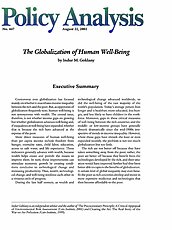Controversy over globalization has focused mainly on whether it exacerbates income inequality between the rich and the poor. But, as opponents of globalization frequently note, human well-being is not synonymous with wealth. The central issue, therefore, is not whether income gaps are growing but whether globalization advances well-being and, if inequalities in well-being have expanded, whether that is because the rich have advanced at the expense of the poor.
More direct measures of human well-being than per capita income include freedom from hunger, mortality rates, child labor, education, access to safe water, and life expectancy. Those indicators generally advance with wealth, because wealth helps create and provide the means to improve them. In turn, those improvements can stimulate economic growth by creating conditions conducive to technological change and increasing productivity. Thus, wealth, technological change, and well-being reinforce each other in a virtuous cycle of progress.
During the last half century, as wealth and technological change advanced worldwide, so did the well-being of the vast majority of the world’s population. Today’s average person lives longer and is healthier, more educated, less hungry, and less likely to have children in the work-force. Moreover, gaps in these critical measures of well-being between the rich countries and the middle- or low-income groups have generally shrunk dramatically since the mid-1900s irrespective of trends in income inequality. However, where those gaps have shrunk the least or even expanded recently, the problem is not too much globalization but too little.
The rich are not better off because they have taken something away from the poor; rather, the poor are better off because they benefit from the technologies developed by the rich, and their situation would have improved further had they been better able to capture the benefits of globalization. A certain level of global inequality may even benefit the poor as rich countries develop and invest in more expensive medicines and technologies that then become affordable to the poor.
About the Author

This work is licensed under a Creative Commons Attribution-NonCommercial-ShareAlike 4.0 International License.
